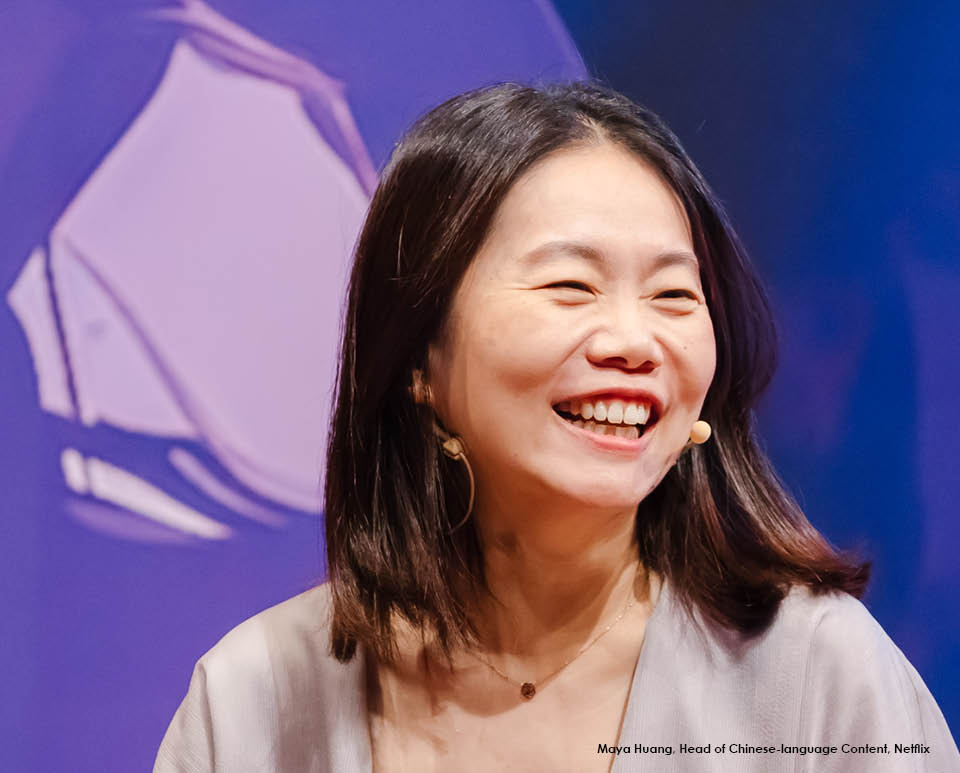
Netflix has high hopes for "Born for the Spotlight", a 12-episode Mandarin series from Taiwanese filmmaker Yen Yi-wen. The series speaks to everything the streamer has been moving towards since 2020, says head of Chinese-language content, Maya Huang.
Original Taiwanese drama, "Born for the Spotlight", premieres on Netflix on 7 November, a tiny bit shy of two years since Maya Huang joined Netflix, four years since the streamer unveiled its commitment to Chinese originals, and eight years since it rolled out in Taiwan. The auspicious geometric progression seems to come at a time of particular harmony for the Taipei-based Chinese-language unit.
The 12-episode series, set in the cutthroat world of show business, has been given the star treatment. Written and directed by Yen Yi-wen ("The Making of An Ordinary Woman") and produced by Olive Ting ("Oh No! Here Comes Trouble"), "Born for the Spotlight" was the only Chinese-language title selected for the On-Screen section of this year’s Busan International Film Festival (BIFF) in October, where it premiered ahead of its streaming release.
"Born for the Spotlight" is the poster series for what Huang and Netflix are trying to achieve. “It’s such a great example of a successful local creator trying to do something bigger,” Huang says. A former actress, Yen’s "The Making of An Ordinary Woman" was a small scale but hugely popular family dramedy. "Born for the Spotlight" is a super-juicy drama, all about the glamour of showbiz, “on a much larger scale, but still very close to the creator’s heart”.
A screenwriter in a previous life, Huang was behind movies such as "Big Little Women" and "End of Summer". She became Netflix’s head of Chinese-language content at the beginning of this year.
Huang says joining Netflix has given her “the opportunity to take what I learned to the other side, to share with the platform but also to build better communication and to be a bridge for Netflix and creators”.
Asked during the ContentAsia Summit in Taipei in September about what she thinks her creative background brings to the Netflix role, Huang said “being a writer is being all about creating all these characters, creating the story, building the world in your head, and you ...
Netflix has high hopes for "Born for the Spotlight", a 12-episode Mandarin series from Taiwanese filmmaker Yen Yi-wen. The series speaks to everything the streamer has been moving towards since 2020, says head of Chinese-language content, Maya Huang.
Original Taiwanese drama, "Born for the Spotlight", premieres on Netflix on 7 November, a tiny bit shy of two years since Maya Huang joined Netflix, four years since the streamer unveiled its commitment to Chinese originals, and eight years since it rolled out in Taiwan. The auspicious geometric progression seems to come at a time of particular harmony for the Taipei-based Chinese-language unit.
The 12-episode series, set in the cutthroat world of show business, has been given the star treatment. Written and directed by Yen Yi-wen ("The Making of An Ordinary Woman") and produced by Olive Ting ("Oh No! Here Comes Trouble"), "Born for the Spotlight" was the only Chinese-language title selected for the On-Screen section of this year’s Busan International Film Festival (BIFF) in October, where it premiered ahead of its streaming release.
"Born for the Spotlight" is the poster series for what Huang and Netflix are trying to achieve. “It’s such a great example of a successful local creator trying to do something bigger,” Huang says. A former actress, Yen’s "The Making of An Ordinary Woman" was a small scale but hugely popular family dramedy. "Born for the Spotlight" is a super-juicy drama, all about the glamour of showbiz, “on a much larger scale, but still very close to the creator’s heart”.
A screenwriter in a previous life, Huang was behind movies such as "Big Little Women" and "End of Summer". She became Netflix’s head of Chinese-language content at the beginning of this year.
Huang says joining Netflix has given her “the opportunity to take what I learned to the other side, to share with the platform but also to build better communication and to be a bridge for Netflix and creators”.
Asked during the ContentAsia Summit in Taipei in September about what she thinks her creative background brings to the Netflix role, Huang said “being a writer is being all about creating all these characters, creating the story, building the world in your head, and you have full control ... But I am not only interested in my own writing. I’m also interested in helping others people develop their stories, to get their projects going”.
“I think my superpower is the ability to be really subjective when it’s the emotional journey, when we are trying to create a story, but also be objective when I need to look at a story, to look at the show from different perspectives, from the audience perspective, from the platform’s perspective, from the investors’ perspective.”
Netflix’s focus on Chinese content isn’t brand new. The platform made its larger commitment known in 2020, going on to back shows such as dramas Copycat Killer and Wave Makers, both released in 2023.
Huang says Netflix spent time “really trying to understand the audience locally, the audience of Chinese-language content and also the landscape of the creative community, of the production capacity here”.
“We’ve had ups and downs, there’s no one single success formula for making a good story, for making a good show... it’s not only about single titles. We realised that there is a very strong appetite among local audiences for premium Chinese-language content. Audiences in Taiwan have such strong, love, passion, and also a sense of pride for Chinese-language content coming out of Taiwan. That’s one big win we found... and the other is really about the local creative community,” she says.
"Copycat Killer", for example, was adapted from a Japanese novel. “The local creators were able to translate it into a story that is so authentic, and relatable... But in the meantime, it has the most thrilling and most engaging element of the crime genre that it is able to attract a wider audience, even outside Chinese-speaking regions.”
"Wave Makers", a political drama Huang describes as the "West Wing" of Taiwan with a #metoo storyline, also changed the game in a big way. Produced by KOKO Entertainment for Netflix, the series was directed by Chun-Yang Lin ("The World Between Us") and written by Li-Ying Chien and Wei-Chao Peng.
“We are seeing that creators in Taiwan, whether it’s producers, writers or directors, have a very strong sense of social topics, social issues, that is super relevant to local audiences, and also connects the local culture to the bigger global context,” Huang says.
"Wave Makers" is at its core the story of a woman who is the victim of an abusive relationship. “When the show was launched, it got so much attention... it ignited the #metoo movement in Taiwan’s local entertainment industry. And then, foreign press like BBC and CNN picked up the story. It is such a great example for us that we are able to have local creators, telling local stories and using our platform to reach a wider audience and also connecting a local story to a global context,” she says.
In addition to dealing with social issues, Huang says Taiwanese creators can be very innovative with stories. Action comedy "Marry My Dead Body", for example, is both deeply rooted in local culture and in the universal theme of family crisis. The film, directed by Wei-Hao Cheng, is a coming-of-age story about a dead gay man and the conflict/reconciliation between him and his father. "Marry My Dead Body" spent two weeks on Netflix global non-English film top 10 in 2023, and was a top 10 film in six countries.
“The premise of the story is very local but it has such a contemporary element in the LGBTQ story and the genre is universal. It is a family drama, mixed with comedy. The emotional journey and theme resonated with a wider audience,” Huang says.
“What we are looking for are stories that will first and foremost resonate, work for our local audience, which is in Taiwan. When we talk about Chinese-language content, about a Chinese-speaking audience, we are not talking about a diaspora all over the world. We are more focused on the Asia-Pacific region. We don’t only share a language. There’s also the culture, the history.”
“We are looking for creators and producers who are aware of audience needs and have authentic stories that resonate with local viewers first. We have to make sure they are willing to go on their journey on a storytelling, production scale and quality level that will meet our global standards,” she adds.
There is no single formula for success, and there’s definitely no quick and easy path to a “global audience”. Huang says Netflix’s approach is uniform in every region. “A show needs to be successful locally first, and then, with the strength of our platform, we will find its wider audience,” she says.
Within the broad Chinese-language category, every market has its own ecosystem. “For example, the production capacity, the ecosystem, here in Taiwan has its own challenges but also its own strengths. What we are doing right now is making long-term investments in talent, both above and below the line, one original show at a time.”
“We are working with local talent to bring up the quality of the storytelling, the quality of the production, and also implement best practices when comes to elements like safety, respect, etc,” she says. The strategy includes bigger industry-facing workshops, focusing on, for instance, writers rooms and VFX. The longer-term goal is to build a positive creative cycle.
In addition to making local language originals and licensing Taiwanese shows, Huang and her team also acquire Mainland Chinese content and titles from across the Chinese-speaking world. Rather than focusing on which Chinese-language market is bigger/better/best, Huang speaks of all types of Chinese content co-existing on the platform. “Each region has different strengths,” she says.























